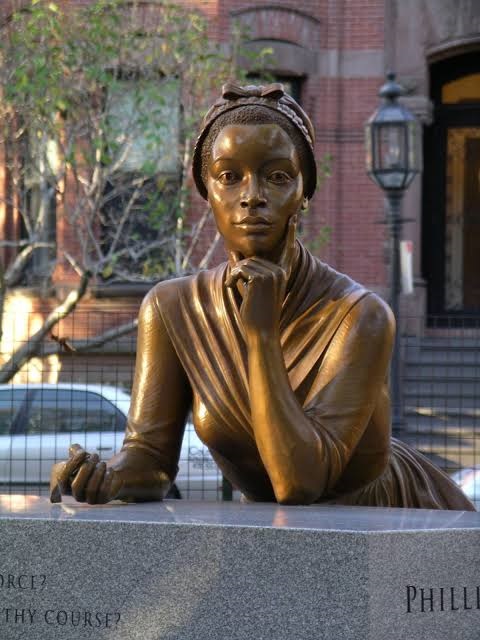By: Bully Sowe
If Gambians ever heard her name, Phillis Wheatley would be remembered as one of their descendent. This remarkable woman, born in present-day Gambia, overcame unimaginable odds to become one of the most celebrated poets and writers of her time. Her life story is a testament to the resilience and strength of the human spirit, and her work continues to inspire and uplift people all over the world. Phillis was a Fulani girl, the daughter of a herbalist and peasant, and she was sold into slavery at a young age. Despite the horrors of captivity, she never lost her love for language and learning. She taught herself to read and write in English, and she became an accomplished writer and thinker.
Phillis Wheatley’s life story is a testament to the enduring spirit of resilience and the boundless potential of the human mind. Born in West Africa, present-day Gambia, in 1753, Phillis just like Kunta Kinteh was captured and sold into slavery. She was born into a family of peasants before her capture and enslavement. At a tender age, Phillis who was named after the voyage ship that took her to the Americas, was taken to the ‘New World’ to never return to her homeland.
Her unique background and heritage made her stand out in a sea of enslaved Africans, and it was not long before she attracted the attention of her owners, John and Susanna Wheatley. They quickly discovered her incredible intellect and love for learning, and they began to educate her in earnest.
One of her most famous poems was “On Being Brought from the land of Gambia to America,” in which she celebrated the beauty of her homeland and lamented the cruelty of slavery. She wrote,
_”Remember, Christians, Negros, black as Cain,/
May be refin’d, and join th’ angelic train
_Twas mercy brought me from my Pagan land’’_.
Her work was celebrated in her time, and she was recognized as one of the most important literary figures of the day. Phillis was a quick learner, and she soon became fluent in English. She was also an avid reader and devoured every book she could get her hands on. Incredibly, she began writing poetry at the age of 13, and her work soon attracted the attention of the Boston elite. Her first published poem, “On Messrs. Hussey and Coffin,” appeared in a local newspaper in 1767, and her work continued to be published throughout her life.
Despite her success as a writer, Phillis was never fully accepted by the Boston elite. She was a Black woman in a world dominated by white men, and her status as an enslaved person further compounded her marginalization. However, she refused to be silenced, and she continued to write and publish, becoming one of the most celebrated poets of her time.
Phillis Wheatley’s literary prowess earned her the recognition of influential figures such as George Washington, who praised her work and invited her to meet with him at his headquarters in Cambridge in 1776. Wheatley presented Washington with a poem that honoured him and his leadership during the Revolutionary War. This encounter cemented Wheatley’s status as a respected writer and earned her a place in American history.
Phillis’ work often dealt with themes of freedom and the beauty of her homeland. In her poem, “On Being Brought from Africa to America,” she wrote, “Some view our sable race with scornful eye, / “Their colour is a diabolic die.” / Remember, Christians, Negros, black as Cain, /May be refin’d, and join th’ angelic train.”
Phillis’ unique background as a slave, black woman and her Gambian heritage also shone through her work. She was deeply connected to her homeland and her people, and her poetry was infused with a deep love and respect for her African roots.
Phillis Wheatley’s life and work continue to inspire and uplift people all over the world. Her legacy is a testament to the resilience and strength of Black people, and her work is a reminder that greatness knows no bounds. Her story is one of triumph over adversity, and her poetry is a testament to the power of the human spirit.
After her death, Wheatley was buried in an unmarked grave, but in 1838 a group of abolitionists raised funds to create a memorial for her in the Granary Burying Ground in Boston, where she was buried. The memorial recognizes Wheatley’s remarkable achievements and serves as a reminder of the contributions of Black women to American literature and history. Her life and legacy are a reminder that greatness can come from the most unexpected places, and that even in the darkest of times, there is always hope.
The story of Phillis Wheatley is also a poignant reminder of the cruelty of slavery and its devastating impact on African families and communities. A young girl torn from her homeland, forced to endure the horrors of the Middle Passage, and sold into slavery in a foreign land, Wheatley’s story is a testament to the resilience and strength of the human spirit. Her life is a reminder that our destiny is often shaped by forces beyond our control, and that the evil of slavery continues to reverberate through the generations.
The pain and suffering inflicted on Wheatley and countless others is a tragedy that can bring tears to the eyes of even the most stoic of observers. But in Wheatley’s case, her remarkable talent and indomitable spirit allowed her to rise above the horrors of slavery and leave an enduring legacy as a writer and a symbol of hope and inspiration for generations to come.
Wheatley’s story highlights the ongoing struggle for racial justice and equality, as her achievements were made possible only through the hard work and advocacy of abolitionists and others who fought against slavery and racism. By recognizing the legacy of individuals like Phillis Wheatley, we can honour their contributions and continue to strive towards a more just and equitable society for all.




